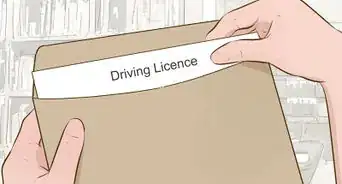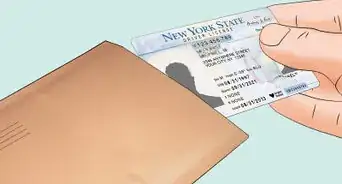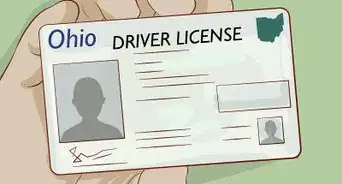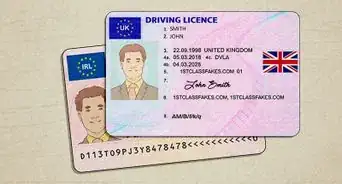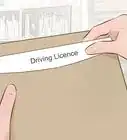This article was co-authored by Clinton M. Sandvick, JD, PhD. Clinton M. Sandvick worked as a civil litigator in California for over 7 years. He received his JD from the University of Wisconsin-Madison in 1998 and his PhD in American History from the University of Oregon in 2013.
This article has been viewed 149,253 times.
If your driver's license has been suspended, or is about to be suspended, you may be able to appeal the suspension and have your license reinstated. Each state has its own appeal policies, but the general process is similar in each state. To appeal a license suspension, you will need to file the correct paperwork with the appropriate agency and attend a hearing.
Steps
Deciding to File an Appeal
-
1Determine why your license are suspended. The Department of Motor Vehicles (the “DMV," also known as the Bureau of Motor Vehicles or Department of Transportation in some states) should have mailed you a suspension letter stating the reason for the suspension. If you never received such a letter or have misplaced it, call the DMV in your state or check the DMV's website for a database that you can search to find your license information and reason for suspension. You can find links to each state's DMV website here. Common reasons for suspension include:
- Accumulating too many points on your driving record
- Getting multiple traffic violations or speeding tickets
- Getting a DUI/DWI
- Failing to appear in court or pay fees
- Failing to pay child support
-
2Determine whether an appeal is available to you. In some cases, such as automatic pretrial suspensions for driving under the influence (“DUI”), you may not have the right to appeal.[1] In any case, you need to request an appeal within the statutorily-prescribed deadline. For example, appeals in Georgia must be submitted within 10 days of the effective date of suspension. If you are not eligible for an appeal or have missed the deadline, you may need to temporarily live with the suspension. To determine if an appeal is available to you:
- Check your DMV's website for information about appealing a suspension.
- Look for information about appeals in the letter you received informing you of the suspension.
- Call your local DMV and ask about the appeals process.
- Contact an attorney. Many attorneys provide free consultations.
Advertisement -
3Consider alternatives to an appeal. If your license has been suspended, the court will specify how you can get your license back. You may simply be required to refrain from driving for a period of time, or you may be able to get your license back more quickly by taking a driving course or traffic school, paying a reinstatement fee, or asking your insurance company to file an SR-22 or FR-44 form (which proves that you carry insurance[2] ).
- For certain suspensions and revocations, you may be able to request a "hardship" or "probationary" license that allows you to drive in limited situations, such as driving for work, attending drug and alcohol programs, or for medical treatment. Contact your local DMV office to find out whether your state offers hardship licenses.
Filing an Appeal
-
1Determine where to file your appeal. Usually, you must file an appeal with the appropriate "administrative agency" instead of a court. For example, in Arizona, appeals are heard by the Arizona Motor Vehicle Administration.[3]
- If you are not satisfied with the outcome of your administrative hearing, you can appeal in court. However, because appeals require an argument that administrative decision misinterpreted the law, you should consider hiring an attorney to handle a complicated case.
-
2Request a hearing. All states have a specific procedure for requesting an administrative hearing. Once you submit your request, the agency will contact you and give you a hearing date. Some states use specific forms for requesting a hearing, while others accept more informal emailed or written requests.
- For example, in Alabama, there is no form for requesting a hearing. You must make your request by mail or email and include your name, date of birth, and driver's license number.
- For comparison, Arizona requires that you request a hearing by filling out this Hearing Request form and mail it to the included address.
-
3Prepare for your hearing. An administrative hearing is an informal trial. You will have the opportunity to present evidence, including documents and sworn testimony. At the beginning, you can make an opening statement explaining to the administrative law judge what you believe the evidence will show. At the end, you can make a closing argument explaining why you think the judge should rule in your favor.
- To prepare for your hearing, gather any documents that support your claim that your license should not be suspended. Also contact any witnesses who can testify on your behalf and arrange for them to attend the hearing with you.
- Be prepared to clearly argue why your license should not have been suspended. Did the DMV or court misunderstand the facts of your situation? Did they misinterpret the law? Make sure you understand what facts and law they relied upon before you address why those facts or law were inaccurately applied.
-
4Observe another hearing first. You may be able to attend another person's public hearing as an observer. Upon entering the hearing room, inform the administrative law judge that you are there to observe the proceedings.[4] Watch quietly and take note of what the participants did well and what could have been done better.
Warnings
- This article is intended as legal information and does not provide legal advice. If you need legal advice, contact a licensed attorney.⧼thumbs_response⧽
References
About This Article
Appealing the suspension of your driver’s license is only possible in some cases, so it’s important to visit the Department of Motor Vehicles’ website in your state to confirm the local regulations. For example, many states don’t allow an appeal if your license was suspended for DUI. You also usually need to file an appeal within 10 days of the suspension, so you’ll need to act quickly after receiving the letter. Depending on your state’s regulations, you’ll either fill out a form or write a letter to request an appeal. If you want an administrative hearing, which is where a judge hears evidence about your case, request it from the department where you filed your appeal. For tips from our Legal co-author on how to prepare for your administrative hearing, read on!








